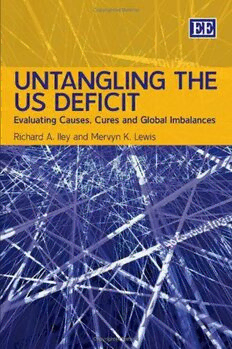
Untangling the US Deficit: Evaluating Causes, Cures and Global Imbalances PDF
285 Pages·2007·1.465 MB·English
Most books are stored in the elastic cloud where traffic is expensive. For this reason, we have a limit on daily download.
Preview Untangling the US Deficit: Evaluating Causes, Cures and Global Imbalances
Description:
From a situation of near zero in 1990, the US current account deficit has expanded to a record level of almost $900 billion in 2006. Debate about the deficit's causes and consequences has also grown. Is the deficit a product of American profligacy or a 'glut of savings' in the rest of the world? Is it a disaster waiting to happen or the natural and essentially benign consequence of an integrated world economy? "Untangling the US Deficit" charts a course between these competing explanations in a systematic and rigorous approach, incorporating the latest academic research and market data, gauging the origins and sources of the deficit, its sustainability and the urgency of corrective action. Richard Iley and Mervyn Lewis conclude that there is no single cause of the US current account deficit and no single solution. While they view the deficit as primarily 'made in USA' with the monetary policy of the Greenspan Fed playing a greater role than China's exchange rate policies, the unique role of the US dollar in the world order means that the deficit is less threatening and more sustainable than is often argued. The authors see no compelling case for policy intervention to 'tackle' the deficit. This unique and well-researched book will be of great interest to academic economists and postgraduates. Market, business and government economists will also find it to be an enlightening and challenging account.
See more
The list of books you might like
Most books are stored in the elastic cloud where traffic is expensive. For this reason, we have a limit on daily download.
